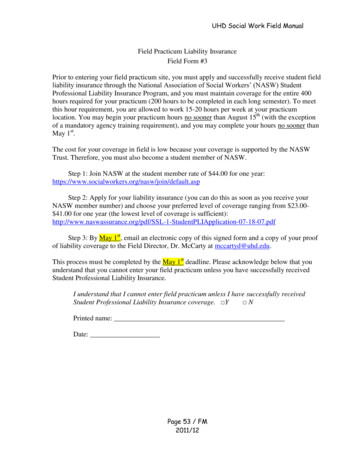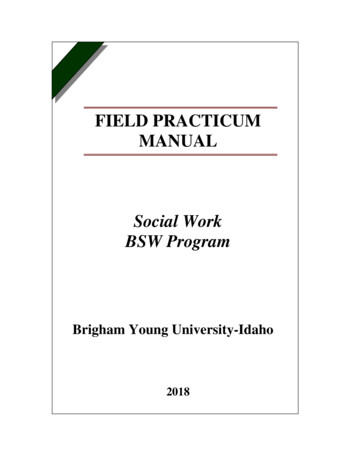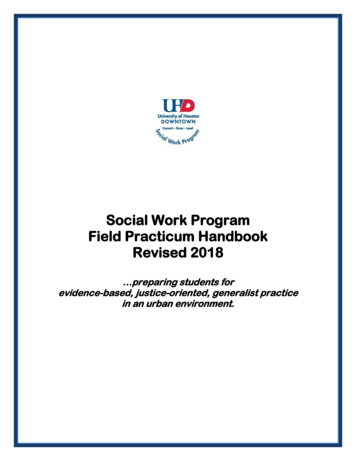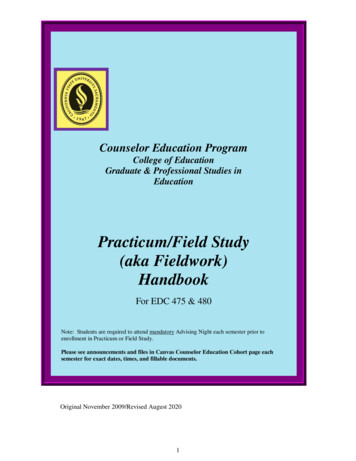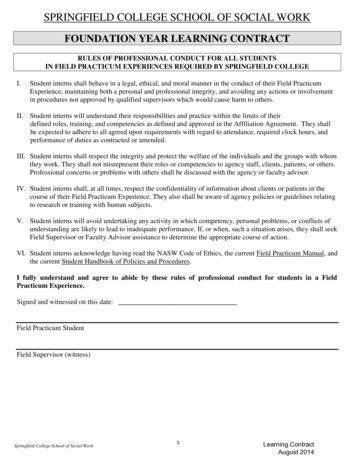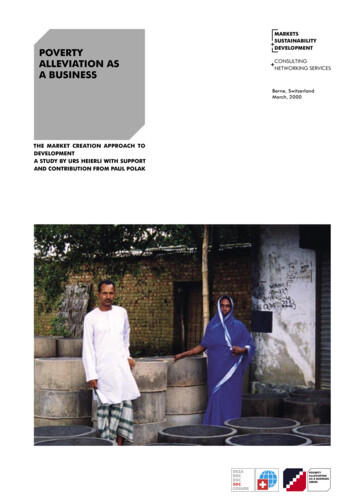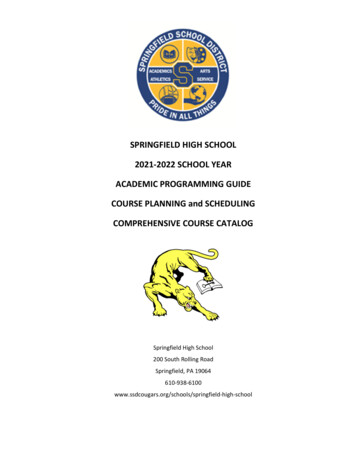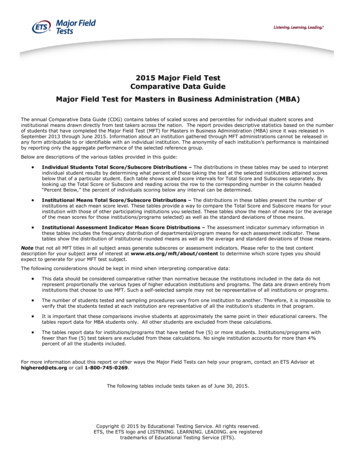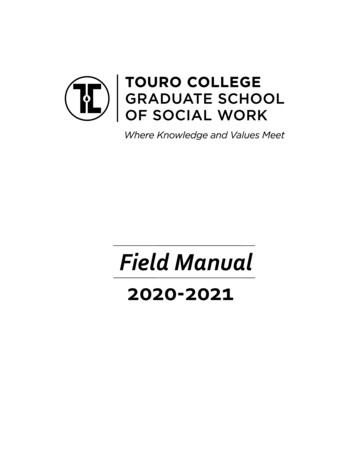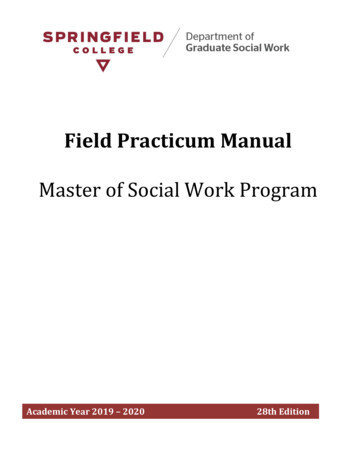
Transcription
Field Practicum ManualMaster of Social Work ProgramAcademic Year 2019 – 202028th Edition
Springfield College Department of Graduate Social Work
TABLE OF CONTENTSINTRODUCTION . 1I.SPRINGFIELD COLLEGE AND THE DEPARTMENT OF GRADUATE SOCIALWORK. 3A.B.C.D.Springfield College . 3Department Mission. 3Accreditation. 3Student Handbook of Policies and Procedures . 3II.PURPOSE OF FIELD EDUCATION . 4III.DESIGN OF FIELD PRACTICUM SEQUENCE . 5A.B.C.D.Generalist Year (MSSW 684, MSSW 674 & MSSW 685) . 5Specialization Year (MSSW 686, MSSW 676 & MSSW 687) . 10Integration of Field Practicum with the Academic Curriculum . 14Academic Course Integration with the Field Practicum . 15IV.EXPECTED LEARNING ASSIGNMENTS IN FIELD . 16A.B.Generalist Year . 16Specialization Year . 23V.FIELD STAFF ROLES AND RESPONSIBILITIES. 30A.B.C.D.Assistant Dean for Field Education, Assistant Directors, and Office of Field Education Staff . 30Faculty Advisor . 31Field Supervisor . 33Field Placement Advisory Committee . 35VI.FIELD AGENCIES AND PRACTICUM ASSIGNMENTS. 36A.B.C.D.E.F.G.H.I.Field Agencies . 36Generalist and Specialization Year Practica . 37Field Practicum Assignments . 38Dual Practicum Sites. 39Liability Insurance . 39Employment-Based Practicum . 40Remaining with Agency of Employment for Second Practicum. 41Remaining with Same Agency for Second Practicum . 41Student Exploration of a Potential Placement . 41VII.STUDENT RESPONSIBILITIES . 41A.B.C.D.E.Hours . 41Integration of Learning . 43Utilization of Supervision . 43Process Recording . 47Record Keeping and Written Materials . 48Springfield College Department of Graduate Social Work
VIII. LEARNING CONTRACTS AND ACTIVITIES . 49IX.EVALUATION . 49A.B.C.D.Of Student Performance – By Field Supervisor and Faculty Advisor. 50Of Field Practicum – By Faculty Advisor and Student . 55Of Faculty Advisor – By Student . 55Of Springfield College MSW Program – By Field Supervisor . 55X.A.B.C.D.SOCIAL WORK VALUES AND ETHICS . 55NASW Code of Ethics . 55Harassment Policy . 56Policy on Dual Relationships and Conflict of Interest . 56Disclosure of Student Status . 57XI. SAFETY POLICIES AND PROCEDURES . 57A.B.C.Concern for Safety . 57Expected Agency Safety Guidelines . 58Safety Guidelines for Students in the Field . 60XII.ADDITIONAL POLICIES . 61A.B.C.D.E.F.G.H.I.J.Field Office Files . 61Students Living at a Distance from the Springfield Area . 62Transportation Costs . 62Liability Insurance . 62Transportation of Clients . 63Dress Code . 63Students Experiencing Difficulty . 64Change of Practicum and Premature Termination of Practicum . 64Academic Assistance and Accommodation Planning . 65Special Note to Students in School Social Work PlacementsRe: Massachusetts Licensure . 66APPENDIX A – Sample Process Recordings and Formats: . 671.2.3.Individuals and/or Families . 69Group . 71Community or Administrative Meetings . 73APPENDIX B - Psychosocial Assessment Content . 75APPENDIX C - Affective or Feeling Words and Phrases for Use in Process Recordings . 79APPENDIX D - Process Recording Template 83Springfield College Department of Graduate Social Work
SPRINGFIELD COLLEGE DEPARTMENT OF GRADUATE SOCIAL WORKFIELD EDUCATION PROGRAMIntroductionThe Springfield College Department of Graduate Social Work Field Education Program is an essentialcomponent of the curriculum in advanced generalist social work at the school. It provides the directpractical experience through which students understand and apply the theories and skills learned in theclassroom. The field experience also affords concrete examples that are used to bring the conceptualrealm of academic work to life.The Field Education Program is a collaborative endeavor involving the Office of Field Education,Faculty, Field Agencies, Field Supervisors, and graduate social work students. Our success is achievedonly through the consistent, conscientious effort of all these team members working toward a commongoal -- promoting and enhancing the knowledge, skills, and capacities of each student, therebymaximizing their potential as a professional social worker.The Field Education Program reflects the advanced generalist curriculum of the MSW Program.Students are expected to engage in multilevel practice experiences designed to develop their abilities indirect service with individuals, families, and groups, and, through community work and agencyadministration, enable them to work effectively in many settings, roles, and systemic levels. All fieldeducation expectations and policies are designed in compliance with the guidelines established by theCouncil on Social Work Education in its Educational Policy and Accreditation Standards (See StudentHandbook of Policies and Procedures).This Field Practicum Manual provides all partners in the field education process with a full descriptionof the purposes, expectations, processes, tools, and other elements of the field practicum component ofthe curriculum. It is essential that everyone involved in field practicum understand and follow theprotocols detailed in this Field Practicum Manual. It should be used in conjunction with the student’sField Workbook for the relevant year of the student’s practicum and with online student evaluations.All partners should review it and related documents carefully and use them as a reference to answerquestions about field practicum issues. If we have omitted any important information, or if somethingis not clear, we hope you will contact us. Your input on how to improve this Field Practicum Manualis welcome.We in the MSW Program at Springfield College look forward to working with you. Together we createfield experiences that promote optimal learning and are rewarding for all who participate in makingthem successful.Sharlene Kerelejza, M.S.W., L.C.S.W. (CT)Assistant Director of Field EducationWilliam T. Fisher, Jr., Ed.D., M.S.W.Chair and Assistant Dean for Field EducationSpringfield College Department of Graduate Social Work1
Springfield College Department of Graduate Social Work2
SECTION ISPRINGFIELD COLLEGE DEPARTMENT OF GRADUATE SOCIAL WORKA.SPRINGFIELD COLLEGESpringfield College is guided by the "Humanics" philosophy, which stresses the development andintegration of mind, body, and spirit in service to others. The College is committed to the preparationof future leaders in both private and public sectors who will improve the quality of life worldwide.The College's mission reflects this effort to develop socially contributory professionals:The mission of Springfield College is to educate students in spirit, mind, and body for leadership inservice to humanity by building upon a foundation of Humanics and academic excellence.Springfield College has a unique history of educating students in a manner that encourages socialresponsibility consonant with the values of the social work profession. This is evident in the College'shistorical role in the preparation of students for work in such venerable social work institutions as theSettlement House and Charitable agencies. In recent times, this is evident through the College'sexplicit focus on the preparation of students for the human-helping professions.B.DEPARTMENT MISSIONThe mission of the Department of Graduate Social Work MSW Program flows naturally from theunique "Humanics" philosophy of the College, which seeks to educate the total person in spirit, mind,and body and to develop socially-conscious leaders committed to the service of humanity. Thelanguage of Springfield College's mission statement is the language of service to community -- alanguage consistent with social work values. The mission of the Department of Graduate Social Workis as follows:Through the teaching of social work practice and knowledge, the Springfield CollegeDepartment of Graduate Social Work prepares individuals to meet universal humanneeds in order to engender mutually beneficial interaction between individuals andsocietal systems at all levels, based on principles of economic and social justice, dignity,and human rights.C. ACCREDITATIONThe Springfield College Department of Graduate Social Work Master of Social Work Program hasbeen continuously accredited by the Council on Social Work Education since 1989.D.STUDENT HANDBOOK OF POLICIES AND PROCEDURESEach year the MSW Program publishes its Student Handbook of Policies and Procedures. Thishandbook contains detailed information about the MSW Program, Academic and ProfessionalStandards, Students' Rights and Responsibilities, curriculum and course descriptions, and other generalinformation. It also includes the current NASW Code of Ethics and the 2015 Educational Policy andAccreditation Standards (EPAS) established by the Council on Social Work Education (CSWE), themost recent educational policies and standards expected by CSWE.Springfield College Department of Graduate Social Work3
SECTION IIPURPOSE OF FIELD EDUCATIONField education is an integral and vital part of the social work curriculum at Springfield College, whichhas a single curricular specialization in advanced generalist practice. Field education occurs throughtwo academic years of field practica. Advanced standing students engage in one year of fieldpracticum, the requirements for which are the second year of the field curriculum.The field practicum sequence serves as the link between knowledge gained in the classroom and thepractice of social work from an advanced generalist perspective. Within the field sequence,components of the Practice, Human Behavior in the Social Environment, Policy, and Researchsequences of the curriculum are integrated and practiced by social work interns.The overall purposes of the practica are: (a) to enhance the student's ability to apply social workvalues, theory, skills, and knowledge to a broad range of systems; (b) to provide opportunities forstudents to learn to foster empowerment among vulnerable populations; and (c) to provide a setting inwhich the mission and goals of the curriculum of the MSW Program may be actualized.Students have the opportunity to apply and refine values, knowledge, and skills under the guidance ofexperienced social work practitioners who serve as Field Supervisors. These field practicumexperiences are brought back to the classroom where they are further examined within the context ofthe knowledge, values, and skills of the social work profession and the advanced generalist approach tosocial work practice.The field practicum is an agency-based practice experience where students develop professional socialwork competence in the application of advanced generalist concepts that are presented and discussedthroughout the academic curriculum. The practicum provides an opportunity for students to: perform,with supervision, a variety of planned multilevel social work interventions; to learn to work effectivelyin different social work settings; and to understand the everyday operations of community and socialservice systems.The practicum requirements are structured within four areas of learning to ensure that students gainexperience in developing a full range of advanced generalist social work practice skills. The four areasof learning are: (1) Direct service with individuals and families, required in both years; (2) Groupwork, required both years; (3) Community development and organization, required in the first orfoundation year; and (4) Administration and organizational development, required in the second orspecialization year.The Springfield College Department of Graduate Social Work (DGSW) places students in a variety ofagencies throughout New England and New York State. Students are exposed to a wide range ofpractice opportunities with clients of diverse backgrounds in both urban and rural settings.Appropriate field settings include a range of human service, educational, health, and criminal justicesettings where students work with individuals, families, groups, organizations, and communities.Periodic field education information sessions serve as means for students to learn about therequirements of the field practicum experience. They provide the student with an additionalopportunity to share with student colleagues and instructors their questions and practicum experiences,allowing enhanced understanding of the knowledge, values, and skills of the social work professionand how the field requirements are integrated into the overall curriculum.Springfield College Department of Graduate Social Work4
SECTION IIIDESIGN OF FIELD PRACTICUM SEQUENCEA. GENERALIST YEAR1. MSSW 684 and 674 & MSSW 685: Field Practicum and SeminarIn the first or generalist year, students spend a total of fifteen hours per week in the field for fifteenweeks each semester, fall and spring, for a total of 450 hours. Field practicum during the generalistyear focuses on direct service with individuals, families, small groups, and communities. Directservice with individuals and families involves assessment and intervention planning, casemanagement, and counseling. Students are expected to lead, or co-lead, one or more groups, in which,when possible, they will have had a direct role in planning and organizing. The direct servicecomponent requires students to: (a) obtain experience with individuals and families conductingpsychosocial assessments (see outline in Appendix B) and counseling, (b) facilitate interagencycollaboration and referral on behalf of clients, and (c) obtain experience in leading or co-leading a widerange of groups (counseling, self-help, education, and support).Community work involves a range of activities, including, where possible, opportunities to applygroup skills to plan and conduct community-oriented meetings, conduct assessments, and work topromote the empowerment of communities (see Generalist Year Field Experience Components fordetails). The generalist year practicum helps students integrate an understanding of individuals andfamilies within the context of particul
The Springfield College Department of Graduate Social Work Field Education Program is an essential component of the curriculum in advanced generalist social work at the school.
